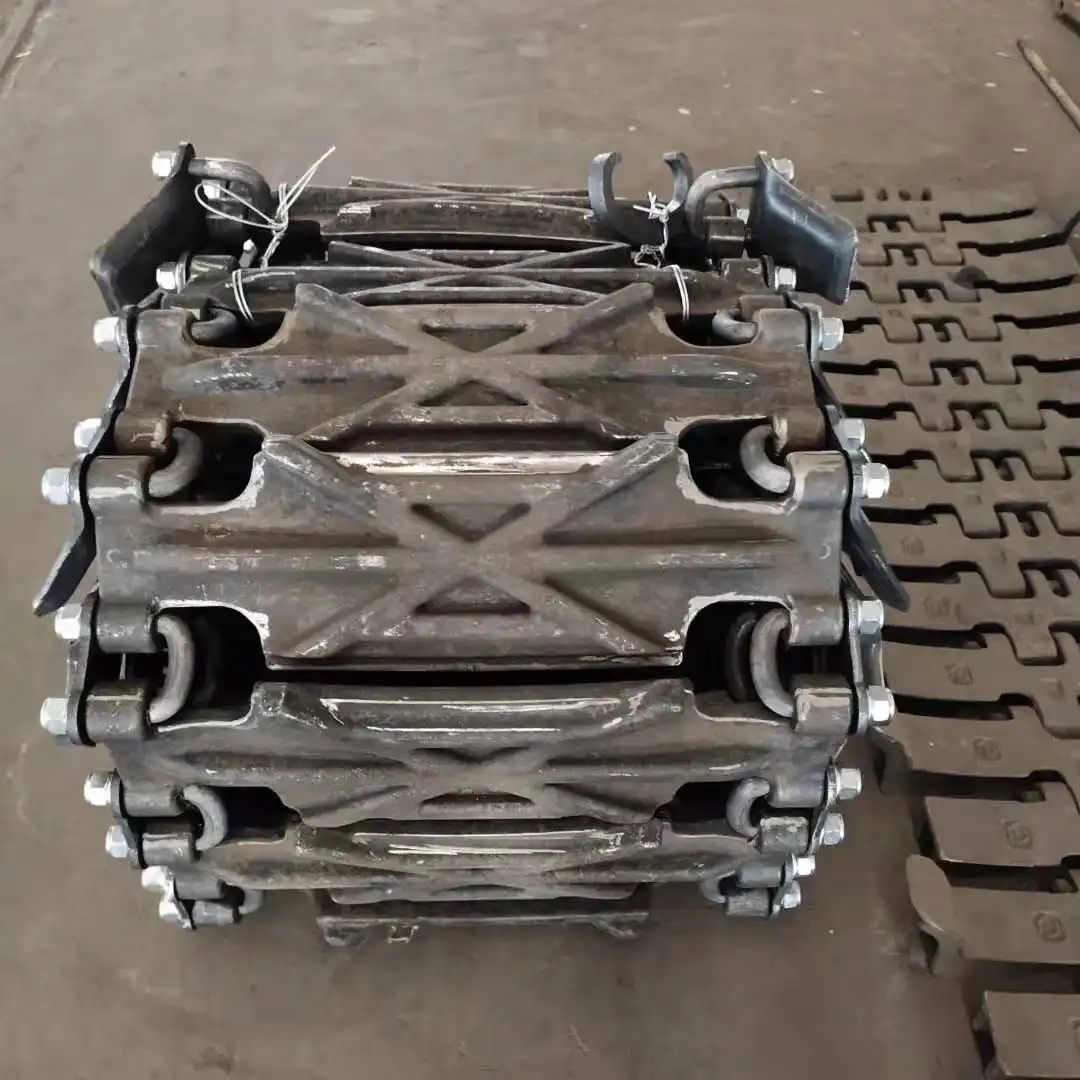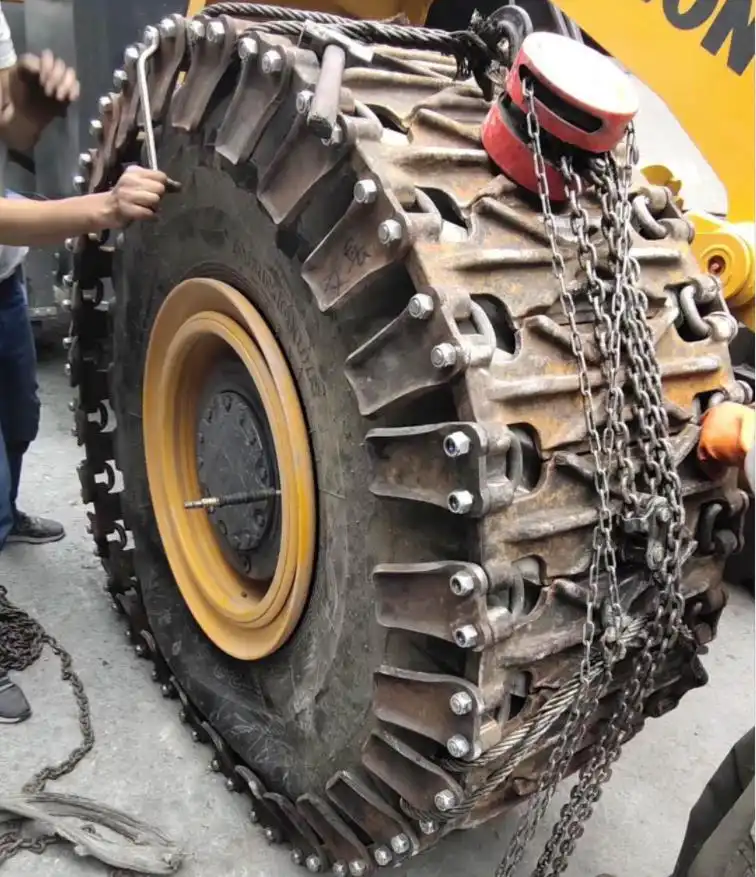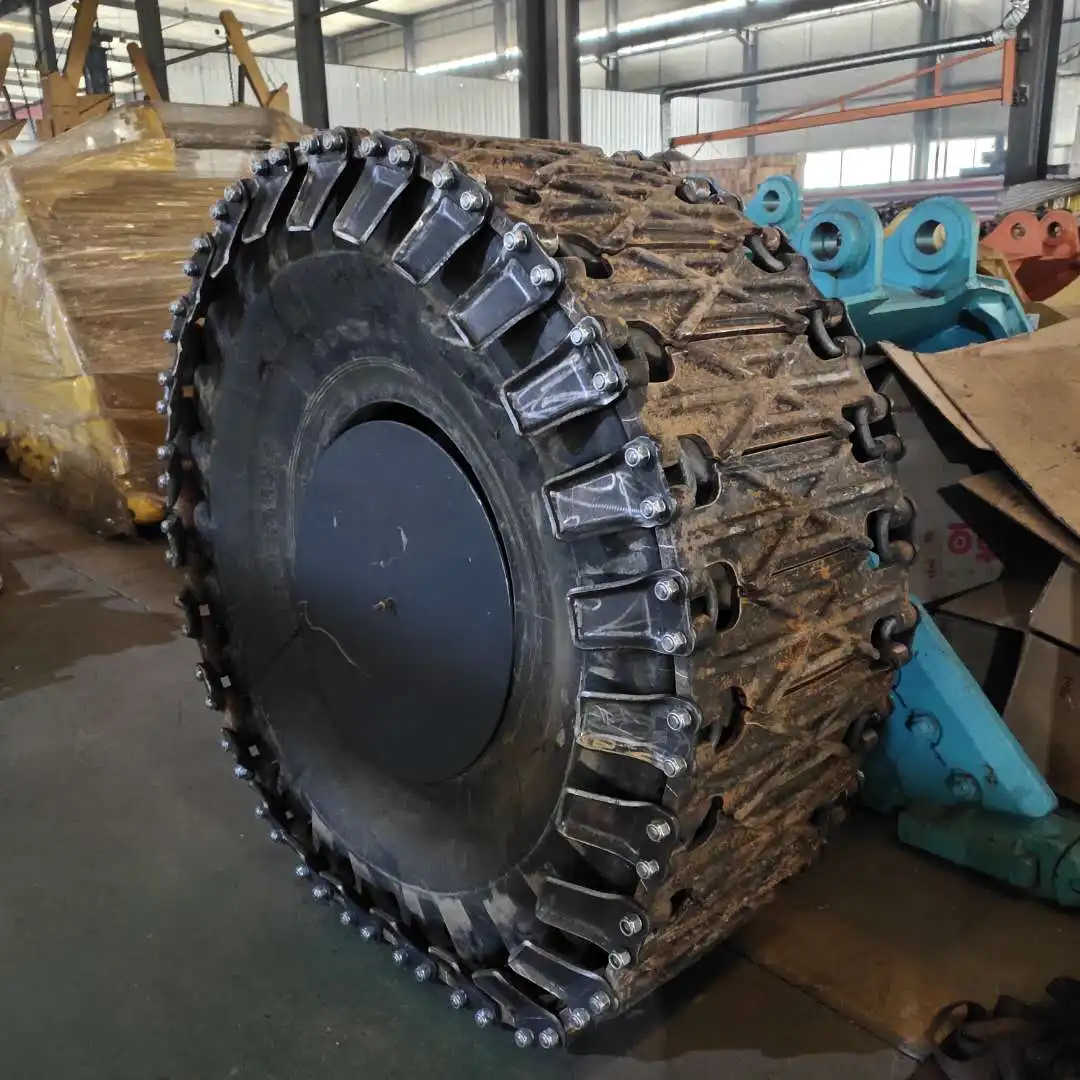Are tire chains universal?
When it comes to loader tire protection chains and other tire chains, the answer is no, they are not universal. While many people assume that one size fits all, the reality is quite different. Tire protection chains, in particular, are designed to fit specific tire sizes and vehicle models. These specialized chains offer enhanced durability and protection for heavy machinery operating in challenging environments. It's crucial to understand that using the wrong size or type of tire chain can lead to poor performance, damage to your vehicle, and potential safety hazards.
Not One-Size-Fits-All
Tire chain sizing: What you need to know
Understanding tire chain sizing is crucial for ensuring optimal performance and safety. Tire chains, including loader tire protection chains, come in various sizes to match different tire dimensions. The key factors to consider when determining the right size include tire width, diameter, and sidewall height. It's important to note that these measurements can vary significantly between different types of vehicles and machinery.
For heavy-duty equipment like loaders, the tire size is typically larger and requires specialized chains. These chains are designed to withstand the immense weight and pressure exerted by the machinery while providing maximum traction and protection. When selecting loader tire protection chains, it's essential to consult the manufacturer's specifications or seek expert advice to ensure a proper fit.
Factors affecting tire chain fit and compatibility
Several factors can impact the fit and compatibility of tire chains. These include:
- Wheel well clearance: The space between the tire and the vehicle's body or suspension components can limit the use of certain chains.
- Tire tread pattern: Different tread designs may require specific chain types for optimal performance.
- Vehicle weight and power: Heavier vehicles or those with more powerful engines may need stronger, more durable chains.
- Terrain conditions: The type of surface you'll be driving on can influence the choice of chain design and material.
For loader tire protection chains, additional considerations include the specific working conditions in quarries, mines, or construction sites. These environments often demand chains that can withstand extreme wear and tear while providing superior traction on loose or slippery surfaces.
Common misconceptions about universal tire chains
Many people mistakenly believe that tire chains are universally compatible with all vehicles and tire sizes. This misconception can lead to purchasing inadequate or ill-fitting chains, potentially resulting in reduced performance or safety risks. Some common myths include:
- All chains fit all tires: Different tire sizes and types require specific chain sizes and designs.
- One chain type works for all conditions: Various terrains and weather conditions may necessitate different chain styles.
- Cheaper universal chains are just as good: Low-quality, generic chains may not provide the same level of protection and durability as specialized options like loader tire protection chains.
It's crucial to dispel these misconceptions and emphasize the importance of choosing the right tire chains for specific vehicles and applications.

Compatibility
How to choose the right tire chains for your vehicle?
Selecting the appropriate tire chains for your vehicle involves several steps:
- Determine your tire size: Check your vehicle's manual or the sidewall of your tires for the correct size information.
- Consider your vehicle type: Different vehicles, from passenger cars to heavy machinery like loaders, require specific chain types.
- Assess your driving conditions: Consider the terrain and weather conditions you'll encounter most frequently.
- Check local regulations: Some areas have specific requirements for tire chains, so be sure to comply with local laws.
- Consult with experts: For specialized equipment like loaders, it's advisable to seek guidance from manufacturers or experienced professionals.
When it comes to loader tire protection chains, the selection process is even more critical. These chains must be able to withstand the extreme conditions often found in quarries, mining operations, and construction sites. They need to provide not only traction but also protection against cuts, punctures, and premature wear.
Tire chain compatibility with different tire types
Different tire types may require specific chain designs for optimal performance and safety. Here's a brief overview of compatibility considerations for various tire types:
- All-season tires: Most standard tire chains work well with all-season tires, but it's essential to match the chain size to your specific tire dimensions.
- Winter tires: While winter tires provide better traction in snow and ice, chains can still be beneficial in extreme conditions. Ensure the chains don't interfere with the tire's tread pattern.
- Run-flat tires: Some run-flat tires may not be compatible with certain chain types. Always check the manufacturer's recommendations.
- Off-road tires: For vehicles with off-road tires, including loaders and other heavy equipment, specialized chains like loader tire protection chains are often necessary to match the aggressive tread patterns and provide adequate protection.
Importance of proper tire chain installation
Correct installation of tire chains is crucial for safety and performance. Improperly installed chains can damage your tires, vehicle, and even pose a risk to other road users. Here are some key points to remember:
- Follow the manufacturer's instructions carefully.
- Ensure the chains are tight and centered on the tire.
- Check and re-tighten chains after driving a short distance.
- Remove chains when they're no longer needed to prevent unnecessary wear.
For loader tire protection chains, proper installation is even more critical due to the high-stress environments in which they operate. Incorrect installation can lead to reduced efficiency, increased fuel consumption, and potential equipment damage.

Universal VS. Vehicle-Specific Tire Chains Compared
Pros and cons of universal tire chains
Universal tire chains offer some advantages but also come with significant drawbacks:
Pros:
- Generally less expensive
- Can fit a range of tire sizes
- Convenient for occasional use
Cons:
- May not provide an optimal fit for all tires
- Often less durable than vehicle-specific chains
- Can be more challenging to install correctly
- May not meet the specific needs of heavy-duty equipment like loaders
Benefits of vehicle-specific tire chains
Vehicle-specific tire chains, including specialized options like loader tire protection chains, offer several advantages:
- Perfect fit for your specific tire size and vehicle model
- Enhanced performance and traction
- Better durability and longevity
- Easier installation and removal
- Improved safety due to proper fit and design
- Tailored to meet specific industry requirements (e.g., mining, construction)
Which type of tire chain is best for your needs?
Choosing between universal and vehicle-specific tire chains depends on several factors:
- Frequency of use: For occasional use, universal chains might suffice. For regular use or professional applications, vehicle-specific chains are often a better investment.
- Vehicle type: Heavy-duty vehicles and equipment, such as loaders, almost always require specialized chains like loader tire protection chains.
- Operating conditions: Harsh environments and demanding applications call for purpose-built, vehicle-specific chains.
- Budget: While universal chains may be cheaper initially, vehicle-specific chains often provide better value in the long run due to their durability and performance.
For industries relying on heavy machinery, investing in high-quality, vehicle-specific chains like loader tire protection chains is usually the most cost-effective and safe option.
Tire chains are not universal. The right choice depends on various factors such as vehicle type, tire size, and operating conditions. For heavy-duty applications in challenging environments, specialized chains like loader tire protection chains are essential for optimal performance, safety, and equipment longevity. Always consult with experts or manufacturers to ensure you select the most appropriate tire chains for your specific needs.
When looking to purchase tire chains, including specialized options like loader tire protection chains, consider the following sources:
- Authorized dealerships for your specific vehicle or equipment brand
- Specialized heavy equipment supply stores
- Online marketplaces that cater to industrial and construction needs
- Direct from manufacturers like TianNuo Machinery for loader tire protection chains
- Local tire shops that offer chains suitable for your region's conditions
Remember to always verify the compatibility of the chains with your specific vehicle and tire size before making a purchase.

FAQ
①Can I use the same tire chains on different vehicles?
It's not recommended. Tire chains are designed for specific tire sizes and vehicle types. Using the wrong chains can lead to poor performance and potential damage.
②How often should I replace my loader tire protection chains?
The lifespan of loader tire protection chains depends on usage and conditions. Regular inspections are crucial, and replacement is typically needed when wear exceeds 50% of the original chain thickness.
③Are tire chains legal in all areas?
Laws regarding tire chains vary by region. Some areas require chains in certain conditions, while others may restrict their use. Always check local regulations before using tire chains.
④Can tire chains damage my vehicle?
Properly fitted and installed tire chains shouldn't damage your vehicle. However, using the wrong size or improperly installed chains can cause damage to tires, wheel wells, and other components.
⑤Do I need special training to install loader tire protection chains?
While not always required, proper training is highly recommended for installing loader tire protection chains. These specialized chains are crucial for safety and performance in demanding environments.
China Loader Tire Protection Chain
TianNuo Machinery, a leading manufacturer of tire chains in China, offers high-quality solutions for heavy-duty equipment. Their products are designed to triple tire lifespan, enhance traction, and boost efficiency in demanding environments such as mines, quarries, and tunnels. With quick installation and low maintenance requirements, TianNuo's chains are an excellent choice for 50 Loader models with 23.5-25 standard tires. For more information about their robust and efficient loader tire protection chains, contact us at boom@stnd-machinery.com.
References
- Smith, J. (2023). "Tire Chain Selection Guide for Heavy Equipment." Journal of Industrial Machinery, 45(2), 78-92.
- National Highway Traffic Safety Administration. (2022). "Safety Considerations for Tire Chain Use in Commercial Vehicles."
- Johnson, R., & Williams, T. (2023). "Comparative Analysis of Tire Chain Types for Mining Operations." Mining Engineering Review, 31(4), 112-125.
- AutoZone. (2023). "Tire Chain Fitment Guide and Installation Best Practices."
- TireRack.com. (2023). "Understanding Tire Chain Compatibility and Regulations."
- American Automobile Association. (2022). "Winter Driving: Tire Chains and Alternatives for Improved Traction."
About Author: Arm
Arm is a leading expert in the field of specialized construction and railway maintenance equipment, working at Tiannuo Company.

